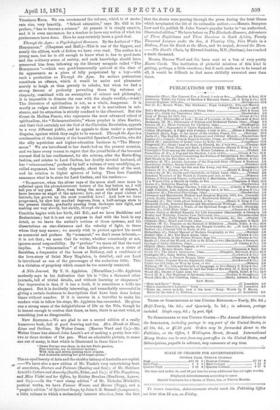Through the Ages : a Psychological Romance. By the Author
of " The
Honeymoon." (Chapman and Hall.)—This is one of the biggest, and nearly the silliest, work of fiction we have ever read. The author is a young man, but he is old enough to know what is due to good-taste and the ordinary sense of society, and such knowledge should have preserved him from following up the literary escapade called "The
Honeymoon "—which was good-humouredly quizzed at the time of its appearance as a piece of folly perpetrated by a boy—with such a production as Through the Ages. Its serious pretensions
constitute an offence, which it would be easier and pleasanter merely to laugh at than gravely to rebuke, but when we find a strong flavour of profanity pervading three big volumes of rhapsody, combined with an assumption of science and philosophy,
it is impossible to dismiss the case with the simple verdict,—trash I The literature of spiritualism is not, as a whole, dangerous. It is mostly as vulgar and illiterate in style as it is marvellous in sub- stance, and its attraction is strictly confined to the illuminati. But the Count de Medina Pomdr, who represents the most advanced school of spiritualism, the "Reincarnationists," whose prophet is Alan Kardec, and their God certainly not the God of the Christian Revelation, appeals to a very different public, and he appeals to them under a specious disguise, against which they ought to be warned. Through the Ages is a continuation of the history of the beautiful Spaniard, Cenobite, who did the silly mysticism and higher-education business in " The Honey- moon." We are introduced to her death-bed on the present occasion, and we have every reason to regret that the proud bride of the baronial coronet died in her confinement, for she returns, after the Katie-King fashion, and relates to Lord Carlton, her doubly devoted husband, all her " reincarnations," prefaced by half a volume of very unedifying,so- called argument, but really rhapsody, about the destiny of the soul, and its relation to higher spheres of being. Thus does Conchita announce what is in store for Lord Canton, and his readers :—
" To-morrow, when the silver rays of the moon shall once more be
reflected upon the phosphorescent waters of the bay before us, I will tell you of my past. How, from being the most wicked of sinners, I have become an angel of the spheres; how, out of the most violent of hatreds, has grown up the most unselfish love ! And how we have progressed, by slow but marked degrees, from a half-savage state to our present station, gradually passing from darkness into light, and making our way slowly, but surely, through the ages."
Conchita begins with her birth, 645 B.C., and we have Buddhism and Brahminiam ; but it is not our purpose to deal with the book in any detail, so we leave the author's notions of those systems, and his dissertations on star-distances and the velocity of light, to those whom they may amuse ; we merely wish to protest against his novel as nonmoral and profane. By " nonmoral," we don't mean indecent,— it is not that ; we mean that its writer, whether consciously or not, ignores moral responsibility. By " profane" we mean all that the word implies. A " reincarnation " of the Indian princess, as a sister of Barabbas, a frequenter of the house at Bethany, and a confidante of the love-story of Saint Mary Magdalen, is detailed, and our Lord is introduced as one of the personages of the audacious fable. This is a violation of propriety which cannot be too severely censured.


































 Previous page
Previous page